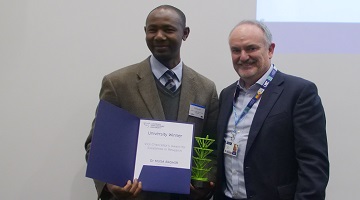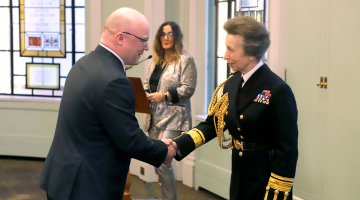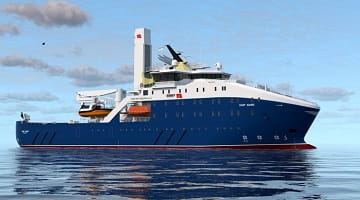2024/25 entry
BEng (Hons) Marine and Mechanical Engineering
Clearing
Want to study with LJMU this September? Visit our Clearing hub to apply now if you have your grades or register your interest and become a Clearing Insider to receive updates while you wait for your results. Your journey starts with Clearing.
Minimum UCAS points required: TBC
Why study Marine and Mechanical Engineering at Liverpool John Moores University?
- Excellent student support from academic tutors, technical staff and student mentors in both practical and academic activities throughout all levels of study
- Professionally-accredited, design-led engineering curriculum emphasises developing understanding through application
- Teaching is supported by well-equipped laboratories and workshops with state-of-the-art software and excellent technical support
- Accredited by the Institution of Mechanical Engineers and approved by the Maritime and Coastguard Agency, giving exemption from theoretical components of the Engineering Officer of the Watch (EOOW) professional qualifications, up to and including the level of Chief Engineer
- International Foundation Year course available offering direct progression onto this degree programme - visit LJMU's International Study Centre to find out more
About your course
The professionally-accredited BEng (Hons) Marine and Mechanical Engineering at Liverpool John Moores University offers you exciting paid placement opportunities plus the chance to transfer onto the MEng programme, where you could secure a Masters-level qualification.
Completing this BEng degree will give you an in-depth understanding of the scientific principles and advanced design technology plus the problem solving and management skills required to be a successful marine engineer.
This is one of the UKs leading engineering departments, with a supportive staff team and excellent facilities including engine test facilities, full marine engine room and bridge simulators, materials testing laboratories and digital design studios, which you have full use of in practical sessions.
Links with national and international companies such as Bibby Line, Rolls Royce, Shell and Castrol mean that the course is tailored to the needs of employers and, as an extension of this, we offer you the opportunity to undertake a years paid placement in industry.
"Teaching is supported by well-equipped laboratories and workshops with state-of-the-art software and excellent technical support plus all students receive a personal copy of Solidworks-CAD software."
Professional accreditation/links
LJMUs policy is to ensure that MEng and BEng engineering degrees are accredited by the relevant UK professional engineering institution and provide the educational base for graduates to gain Chartered Engineer (CEng) status.
Accredited MEng degrees enable graduates to gain CEng status without further study, while accredited BEng degrees will require a further period of study after graduation. If you have demonstrated consistently strong performance at the end of Level 5, you may be offered the opportunity to transfer to the MEng programme. Gaining professional status will be of considerable benefit to you in your future career especially if you join a multinational company and/or need to have your qualification recognised overseas.
The School has held over 30 years of continuous professional accreditation by the Institution of Mechanical Engineers.
The MEng and BEng in Marine and Mechanical Engineering programmes can both lead to marine engineering officer of the watch certification and academic exemption from Class 1 and 2 Engineering Certificates of Competency issued by the MCA.
Fees and funding
There are many ways to fund study for home and international students
Fees
The fees quoted above cover registration, tuition, supervision, assessment and examinations as well as:
- Library membership with access to printed, multimedia and digital resources
- Access to programme-appropriate software
- Library and student IT support
- Free on-campus wifi via eduroam
Additional costs
Although not all of the following are compulsory/relevant, you should keep in mind the costs of:
- accommodation and living expenditure
- books (should you wish to have your own copies)
- printing, photocopying and stationery
- PC/laptop (should you prefer to purchase your own for independent study and online learning activities)
- mobile phone/tablet (to access online services)
- field trips (travel and activity costs)
- placements (travel expenses and living costs)
- student visas (international students only)
- study abroad opportunities (travel costs, accommodation, visas and immunisations)
- academic conferences (travel costs)
- professional-body membership
- graduation (gown hire etc)
Funding
There are many ways to fund study for home and international students. From loans to International Scholarships and subject-specific funding, you'll find all of the information you need on our specialist funding pages.
Employability
Marine Engineers find employment in a variety of areas in the maritime industry both shore based and sea-going.
Specific employment sectors include marine surveying with companies including:
- Lloyds of London
- ship and port operations
- offshore structures
- petrochemicals
- offshore renewable energy
- and power generation
Recent graduate roles include: sea-going chief engineer, marine superintendent, power plant manager, marine surveyor, and petrochemical plant manager.
Student Futures - Careers, Employability and Enterprise Service
A wide range of opportunities and support is available to you, within and beyond your course, to ensure our students experience a transformation in their career trajectory. Every undergraduate curriculum includes Future Focus during Level 4, an e-learning resource and workshop designed to help you to develop your talents, passion and purpose.
Every student has access to Careers Zone 24/7, LJMU's suite of online Apps, resources and jobs board via the LJMU Student Futures website. There are opportunities for flexible, paid and part-time work through Unitemps, LJMU's in-house recruitment service, and we also offer fully funded Discovery Internships.
One-to-one careers and employability advice is available via our campus-based Careers Zones and we offer a year-round programme of events, including themed careers and employability workshops, employer events and recruitment fairs. Our Start-Up Hub can help you to grow your enterprise skills and to research, plan and start your own business or become a freelancer.
A suite of learning experiences, services and opportunities is available to final year students to help ensure you leave with a great onward plan. You can access LJMU's Careers, Employability and Start-up Services after you graduate and return for one-to-one support for life.
Go abroad
LJMU aims to make international opportunities available to every student. You may be able to study abroad as part of your degree at one of our 100+ partner universities across the world. You could also complete a work placement or apply for one of our prestigious worldwide internship programmes. If you wanted to go abroad for a shorter amount of time, you could attend one of our 1-4 week long summer schools.
Our Go Citizen Scheme can help with costs towards volunteering, individual projects or unpaid placements anywhere in the world. With all of these opportunities at your feet, why wouldn’t you take up the chance to go abroad?
Find out more about the opportunities we have available via our Instagram @ljmuglobalopps or email us at: goabroad@ljmu.ac.uk.
A life-changing experience
There's so much more to university than just studying for a degree.
News and views
Browse through the latest stories and updates from the University and beyond
What you will study on this degree
Please see guidance below on core and option modules for further information on what you will study.
Further guidance on modules
Modules are designated core or optional in accordance with professional body requirements, as applicable, and LJMU’s Academic Framework Regulations. Whilst you are required to study core modules, optional modules provide you with an element of choice. Their availability may vary and will be subject to meeting minimum student numbers.
Where changes to modules are necessary these will be communicated as appropriate.
Level 4
Core modules
Engineering Practice
20 credits
This module aims to introduce you to a range of general engineering practices and standards.
Level 5
Core modules
Marine Design and Technology
20 credits
The aim of this module is to provide a comprehensive introduction to Marine Engineering, Naval Architecture and Ship Construction. The module will concentrate on main and auxiliary propulsion systems, ship stability and construction features.
Level 6
Core modules
Marine Design and Propulsion
20 credits
The module aims to analyse many of the critical marine systems associated with ships including aspects of safety within the marine industry.
Teaching and work-related learning
Excellent facilities and learning resources
We adopt an active blended learning approach, meaning you will experience a combination of face-to-face and online learning during your time at LJMU. This enables you to experience a rich and diverse learning experience and engage fully with your studies. Our approach ensures that you can easily access support from your personal tutor, either by meeting them on-campus or via a video call to suit your needs.
Teaching is via a combination of lectures supported by small, group tutorials, online activities, seminars and practical sessions. Initially formal teaching accounts for approximately 23 hours of your week, but decreases to around 14 hours as the course progresses and independent study time increases from approximately 27 to 36 hours per week.
Work-related Learning
This course offers an invaluable opportunity to undertake an industrial placement after your second year. This experience cannot be underestimated as it will give you a chance to put into practice what you have learnt in the first two years, enhance your skills and provide a taste of what its really like to work in industry. It will also give you a head start when you come to negotiate your way around the competitive job market.
Support and guidance
Dedicated personal tutor, plus study skills support
Undoubtedly you will need academic and personal support at times during your course and for this reason you will be allocated a personal tutor to discuss course-related issues, work on a personal development plan and set your own targets.
Should you decide to undertake a years placement, a placement tutor will liaise between you and potential employers and help you to find a suitable post. Once you are settled in your placement, you will have regular support from an academic staff member who will visit you in your workplace to check on progress.
If you plan to take the foundation course as a route onto the degree programme, this is recognised by student finance bodies in England, Wales, Scotland and Northern Ireland, so if you are a UK student and satisfy the standard eligibility criteria, you may qualify for financial support. Please contact the appropriate body for further details.
Assessment
Assessment varies depending on the modules you choose, but will usually include a combination of exams and coursework.
Assessment is usually via a combination of exams and coursework, and sometimes by a portfolio of work, depending on the subject. A final year project gives you the chance to work independently and contributes considerably to your final mark. Your tutors will give prompt and constructive feedback via our virtual learning environment, face-to-face or as written comments. This will help you to identify your strengths as well as the areas where you may need to put in more work.
Course tutors
Our staff are committed to the highest standards of teaching and learning
Facilities
What you can expect from your School
This programme is delivered in the Byrom Street complex of LJMUs City Campus. Here you'll find high quality lecture theatres, meeting and seminar rooms plus social spaces and a large café. The Avril Robarts Library is just minutes away on Tithebarn Street.
The university reserves the right to withdraw or make alterations to a course and facilities if necessary; this may be because such changes are deemed to be beneficial to students, are minor in nature and unlikely to impact negatively upon students or become necessary due to circumstances beyond the control of the university. Where this does happen, the university operates a policy of consultation, advice and support to all enrolled students affected by the proposed change to their course or module.
Further information on the terms and conditions of any offer made, our admissions policy and the complaints and appeals process.











